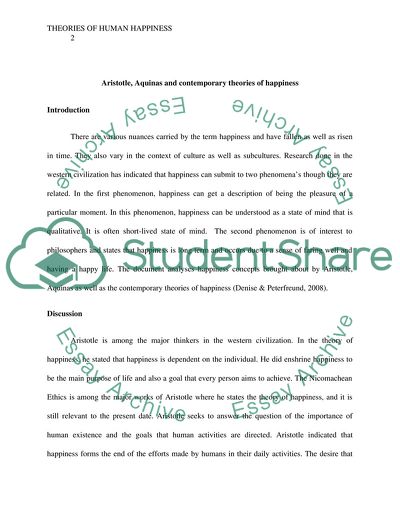Cite this document
(Aristotle, Aquinas and Contemporary Theories of Happiness Coursework, n.d.)
Aristotle, Aquinas and Contemporary Theories of Happiness Coursework. Retrieved from https://studentshare.org/philosophy/1834746-compare-and-contrast-aristotles-view-of-human-happiness-with-aquinas-how-do-their-ideas-differ-from-our-contemporary-ideas-about-human-happiness-compare-contrast-and-evaluate-the-competing-concepts-which-position-do-you-most-identify-with-justi
Aristotle, Aquinas and Contemporary Theories of Happiness Coursework. Retrieved from https://studentshare.org/philosophy/1834746-compare-and-contrast-aristotles-view-of-human-happiness-with-aquinas-how-do-their-ideas-differ-from-our-contemporary-ideas-about-human-happiness-compare-contrast-and-evaluate-the-competing-concepts-which-position-do-you-most-identify-with-justi
(Aristotle, Aquinas and Contemporary Theories of Happiness Coursework)
Aristotle, Aquinas and Contemporary Theories of Happiness Coursework. https://studentshare.org/philosophy/1834746-compare-and-contrast-aristotles-view-of-human-happiness-with-aquinas-how-do-their-ideas-differ-from-our-contemporary-ideas-about-human-happiness-compare-contrast-and-evaluate-the-competing-concepts-which-position-do-you-most-identify-with-justi.
Aristotle, Aquinas and Contemporary Theories of Happiness Coursework. https://studentshare.org/philosophy/1834746-compare-and-contrast-aristotles-view-of-human-happiness-with-aquinas-how-do-their-ideas-differ-from-our-contemporary-ideas-about-human-happiness-compare-contrast-and-evaluate-the-competing-concepts-which-position-do-you-most-identify-with-justi.
“Aristotle, Aquinas and Contemporary Theories of Happiness Coursework”, n.d. https://studentshare.org/philosophy/1834746-compare-and-contrast-aristotles-view-of-human-happiness-with-aquinas-how-do-their-ideas-differ-from-our-contemporary-ideas-about-human-happiness-compare-contrast-and-evaluate-the-competing-concepts-which-position-do-you-most-identify-with-justi.


